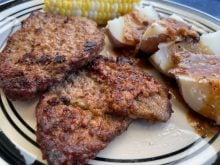LEMBERG, Sask. – Chuck and Marion Leniczek met in the Alberta oil patch and today it continues to keep their Saskatchewan farm business afloat.
Four recent years of drought, frost, rain and cool temperatures have led to poor crops so Chuck is working as a consultant in the oil patch to bring income into their organic operation.
“It’s not fun having a husband away when you have three children,” said Marion, originally a city girl.
The Leniczeks were into healthy eating and lifestyles even before they moved in the 1990s to take over the Lemberg, Sask., farm from Chuck’s dad.
Read Also

AgriStability updates offer stronger support for farmers
One of the most significant updates to the AgriStability program for the 2025 program year is the increase in the compensation rate.
“We were organic consumers before we were organic producers,” said Marion.
After two years of working in Calgary and farming in Saskatchewan, the Leniczeks moved to the farm permanently in 1994. They had been trying to avoid the use of chemicals so by 1995 their four quarters became certified for organic production.
But while their organic crops were growing OK, it was hard to find a processor to clean the seeds for export sales. They began to research the organic processing side and in 1999 built a plant that opened for organic cleaning in February 2000.
It is called Lily and Rose Seed Processors, named for the floral emblems of Saskatchewan and Alberta. The plant can clean up to 700 bushels an hour, and the Leniczeks can also bag, store and arrange marketing.
Marion said they were up front and told other plants that they would be future competitors when they called to ask if they could tour their operations. She said there were only four Saskatchewan plants dedicated to organic cleaning when they started. That number has now doubled.
The Leniczeks built rather than bought the two legs for their seed cleaner and kept them under the roof of the building, since others warned them that seals around legs that poked out of the roof didn’t keep all the moisture out.
They hired Calvin Baran to work in the seed plant with Chuck while Marion concentrated on another venture, meat sheep.
They started with Dorsets in 1997 and now have 100 ewes. They sell the meat at the farmgate after getting it butchered locally. Their three teenaged children help with the care and feeding of the flock.
This year, they have 70 lambs to sell. The sheep are grass fed and tend to be leaner and 10-20 pounds lighter than the market average of 100-120 lb.
Six Komondors, or Hungarian sheepdogs, patrol the pasture and protect the flock. In nine years they have lost only one lamb to coyotes.
On their land they have grown organic wheat, oats, barley, borage, hemp, chickpeas, lentils and flax. They grow clover for green manure every other year to add into their complicated rotation of crops. They are renting a fifth quarter, but Marion said they don’t want to get much bigger because it would take more time and bigger machinery.
Now the couple is looking at becoming buyers and marketers in the organic export industry. Marion has been to Germany three times on sales expeditions and they have had buyers visit their farm from Europe and the United States. She understands why people look to Saskatchewan, with its lack of urban sprawl, for clean food.
“The Europeans have seen what happened with farms and food with land all clustered and crowded.”
In the Prairies, “the organic industry is still a community. It’s small enough you know people and their reputation,” said Marion.
The big issue for the organic industry in Canada is getting a mandatory standard to allow products to be shipped into Europe.
The Leniczeks would also like to develop a value-added product they can make from what their farm produces. Marion has moved a bit down that road by developed a lamb-pork bratwurst type sausage that they sell at the farmgate. But they’ve also talked about raising asparagus or carrots. It is just a matter of initiative and finding the labour to help do it, she said.
Marion said her favourite part of farming is spending hours on the tractor, in the peace of a summer day, with the sheep in sight on the pasture.
“There’s good stuff in all parts of agriculture.”
But she doesn’t want conventional farmers to think of organics as a wonder drug for income.
“If you don’t get good crops, it’s the same as conventional. There’s also lots of overseas competition.”














